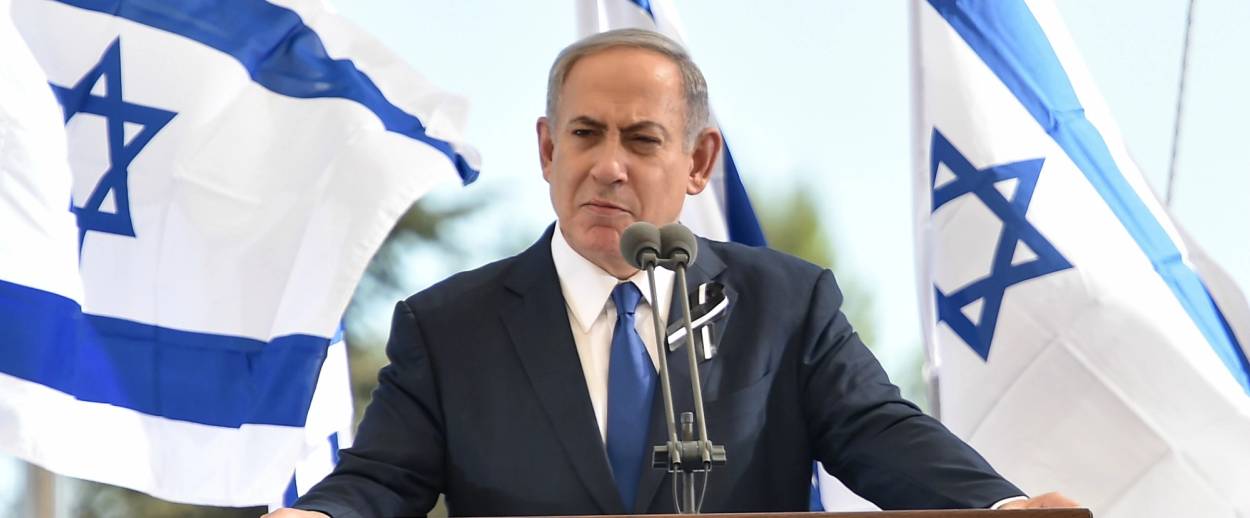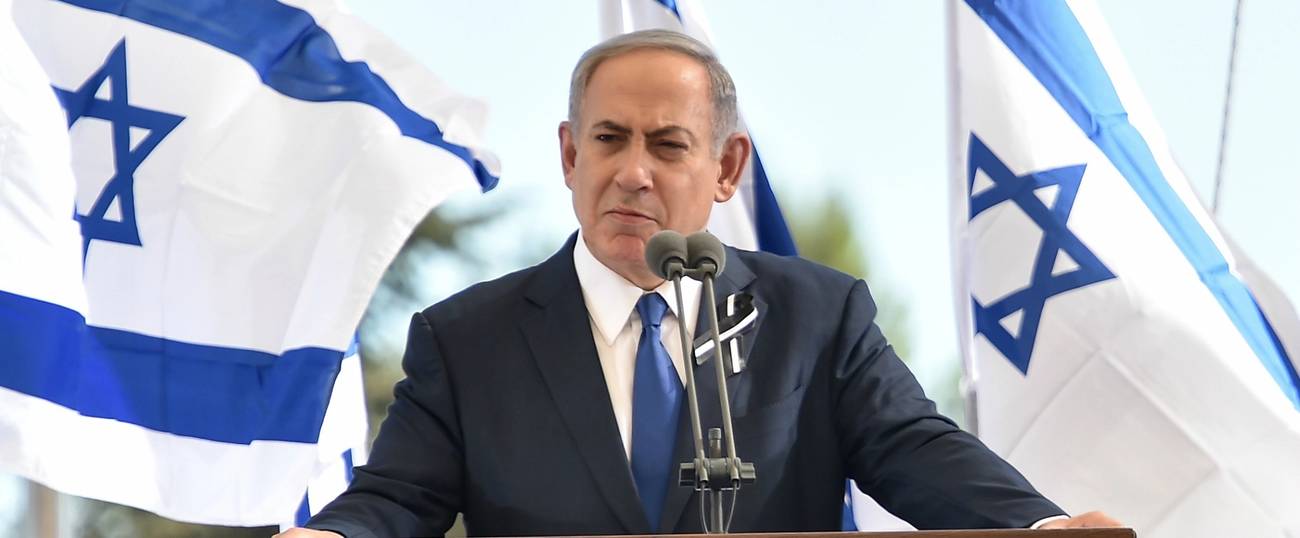Bibi’s ‘Bismarck’ Speech
In a speech last week Bibi celebrated strength and power, but to what end?




The nuclear program that Israel does not officially acknowledge was largely the creation of its former Prime Minister Shimon Peres. It would seem fitting, then, for Israel’s current Prime Minister Benjamin Netanyahu to speak at a ceremony this week for the renamed Shimon Peres Negev Nuclear Research Center. Only, Netanyahu’s speech carried two messages: One honored Peres for his accomplishments while, in another more dramatic voice, Netanyahu could be heard to condemn his predecessor’s legacy.
No surprise, it was the second register bristling with bellicose turns of phrases that attracted all the attention. Parts of the speech were tweeted from the official PM of Israel account.
The weak crumble, are slaughtered and are erased from history while the strong, for good or for ill, survive. The strong are respected, and alliances are made with the strong, and in the end peace is made with the strong.
You may hear echoes of Hoplite warriors, “the strong do what they can and the weak suffer what they must,” Prussian leader Otto Von Bismarck, “it is the destiny of the weak to be devoured by the strong,” V.S. Naipaul’s famous opening lines about “men who are nothing” having no place in the world, or The Strong Horse, the title Lee Smith borrowed from Osama bin Laden’s favorite parable.
It’s hard to hear the Jewish sages saying something like this. It doesn’t exactly sound very “Jewish”; not to say the political leader of a modern nation state has any obligation to invoke religious precedent … though perhaps a coherent ethos of Jewishness is not something the world’s only Jewish state can afford to do without.
What message was Bibi sending?
In the most direct sense, it’s a warning to Tehran. Netanyahu was addressing Iran’s continuing military presence in Syria. Earlier this week, new satellite imagery appeared to show Iranian missile facilities established within striking distance of Israel, in northwest Syria.
The weak crumble, are slaughtered and are erased from history while the strong, for good or for ill, survive. The strong are respected, and alliances are made with the strong, and in the end peace is made with the strong.
— PM of Israel (@IsraeliPM) August 29, 2018
“Those who threaten to wipe us out, put themselves in a similar danger, and in any event will not achieve their goal,” Netanyahu said Wednesday. Adding, “our enemies know very well what Israel is capable of, they know our policy, and anyone who tries to harm us—we will harm them.”
In 2006, Peres issued a similar warning: “The president of Iran should remember that Iran can also be wiped off the map.” And so the continuity is clear. But Netanyahu’s statements were more than just a specific warning directed at Iran. The more grandiose parts of the speech with their overwrought God of War tone reflect not only the threats and exigencies of the moment. They express a particular worldview, one that always had adherents among Zionists, most notably among Jabotinskyites, but once contended with a liberal position of which Peres was also a part and which treated power, not as an end in itself, but a precondition for other aims.
In an excerpt from Peres’ autobiography that appeared in Tablet the former leader of Israel wrote:
As Thomas Hobbes wrote in Leviathan, the “reputation of power is power.” My theory was its corollary: The reputation of nuclear is deterrence. And deterrence, I believed, was the first step on the path toward peace.
His theory came and went. The Peres era drew to a close long before the former Israeli prime minister died two years ago at 93.
Peres, along with Prime Minister Yitzhak Rabin, was a chief architect of the doomed Oslo Accords. Enacted in the early 1990s, Oslo promised peaceful co-existence with an independent Palestinian state achieved through Israeli concessions and negotiations. It was, in a sense, the dream of Israel’s founding Labor leadership finally made real. Rabin was slain two years later by a right-wing Jewish terrorist for signing the accords and trying to make peace with the Palestinians. Peres, the other prophet of the historic “peace process,” lived for another two decades. Long enough to see Oslo fail and with it the vision and ruling power of his generation of Labor Zionists.
Oslo died first, then Peres, and somewhere between them the vision of liberal, Labor Zionism as a path to peace and a principle of power.
Israel, by many measures, has never been stronger. Its relatively tiny population has produced one of the world’s leading technological and military powers. Israel creates more knowledge in absolute terms than France or Great Britain and would pose a serious problem for either nation in a war.
Netanyahu is not shy to acknowledge the benefits of this power. “The process of normalization of major Arab countries with the strong State of Israel is happening before our very eyes, on a scale that would have been impossible to imagine just a few years ago; a process that will hopefully result in peace,” he said Wednesday. And Bibi to his credit has projected that strength effectively in the Syrian conflict; thus far, successfully constraining Iranian encroachments without triggering a major escalation.
In Israel, though, and with its Palestinian neighbors what has he done with that power—corruption scandals notwithstanding?
The Oslo generation had a vision for where power should lead Israel: to concessions that would win peace. Their vision failed.
Protecting the strength necessary to survive is no sin. This is the basic imperative of all life. But the moral life, the Jewish moral life, says that we shouldn’t exult in our power. The Torah is not short on brutality but it does not reward the strong lording over the weak.
Not present at Wednesday’s naming ceremony was Israel’s current president and Peres’ successor, Reuven Rivlin. Apparently, he was not invited.
Jacob Siegel is Senior Editor of News and The Scroll, Tablet’s daily afternoon news digest, which you can subscribe to here.